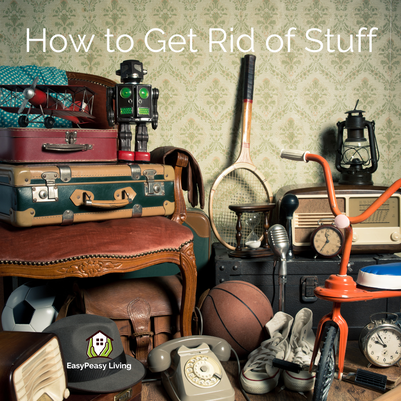 I love being a home organizer! Witnessing my clients’ sheer joy and relief at finally reclaiming their space always brings a smile to my face. Just the other day, I helped a client empty the storage unit she’d been renting for the past 18 months since moving from her home of 30+ years to a smaller condo…just in time to avoid paying next month’s rent!. (We celebrated with a chocolate milkshake…yum!) It’s amazing how much people actually love getting rid of stuff once they’ve made the decision to do it. So what makes deciding to do it so terribly difficult? Most often, not knowing what to do with excess belongings prevents folks from even starting to clear stuff out of their way. This procrastination leads to an ever-growing pile that eventually just feels too overwhelming for some. The longer they put it off, the more daunting the thought of shifting that enormous pile becomes. So it sits…and sits…and sits…gobbling up all of the available breathing space. That’s why I created a guide on how and where to donate, recycle or sell many of the most common items people struggle to divest. It has become the most-visited page on my website and elicits a surprising number of emails from readers wanting to contribute their own suggestions on what to do with all manner of cast-offs. If you haven’t yet visited this treasure trove of information, you’ll find it here in the Free Resources section. I encourage everyone to become part of this collaborative effort and email me if you know of ways to donate, sell, recycle or repurpose in ways not already mentioned. If you’ve been following my blog or Facebook page for any length of time, you’ve no doubt heard me mention the Buy Nothing Project. For those who are unaware of this enterprise, I strongly recommend visiting their website to learn more and consider joining your local group, especially if you yourself have excess stuff you need out of your way but don’t know how to go about getting rid of it. It's all about neighbors helping neighbors...and who doesn't love that?!! Many items that can’t be donated to charity can be shared with your neighbors who need them through a Buy Nothing group. Some examples include food items; opened-but-no-longer-wanted self-care items like shampoo/conditioner, nail polish, lotions or first aid supplies; leftover construction, DIY or craft materials; clothing or other household items with slight defects; cleaning solutions; broken electronics (yes, someone handy may want to fix them or use the parts); empty boxes, jars and packing materials. Heck, one woman in my group was even collecting leftover vegetable peels for making natural dyes! Many of my clients find it easier to part with their more sentimental objects when gifting them to someone that they know really needs or wants them than by merely adding them to a donation box without knowing exactly where they will end up. All it really involves is posting a photo and brief description on the group’s Facebook page to be connected to members who are interested in what you have to offer. If you want to give Buy Nothing a try but aren't sure where to start, request a copy of my free guide to joining and using Buy Nothing. Once you join your local group and understand how it works, getting rid of unwanted items as you go becomes easy peasy and prevents unwanted pileup in your cabinets and closets. It's truly a win for everyone, including the environment! Nothing feels better than coming together as a community to meet each other’s needs. My need for more space and your need for the items I no longer want that are hogging all of it are a match made in heaven! With a little information on what to do with all that stuff, even reclaiming your space can be easy peasy!
0 Comments
 Living life seems to require a lot of stuff. We need stuff to wear...stuff to cook and cook with...stuff to sit, sleep, eat, and work on...stuff to entertain us and stuff to help us entertain others...stuff to help us work more efficiently...stuff to read, write and communicate with...stuff to decorate and create with...stuff to keep us safe and healthy...stuff to make us more comfortable...stuff to keep us smelling, looking and feeling our best...stuff to help us relax...stuff to give each other and stuff to wrap it up in...stuff to keep us warm and stuff to keep us cool...stuff to fix and clean all our other stuff with...and stuff to keep all this stuff organized and accessible when we need it. And every single piece of stuff we own comes with a price tag...not just a financial price tag but also a time, space, effort, convenience and opportunity price tag. Reducing the amount of stuff you own also reduces your overhead costs. Minimalism is about getting by with less stuff so that you can focus more on all those other things that really matter in life. But you don't have to be a minimalist to benefit from making do with less. July is Organizing for Dollars Month, so today I’m going to share a few strategies for shrinking your pile of stuff to save you money...plus a whole lot more. One reason we get so overwhelmed by all of our stuff is that most of us own waaaaayyyyy more than we need or have room to accommodate. We go through phases where we get so fed up we decide to weed out our closets and donate our excess...and it feels pretty great for a while. But eventually, we end up right back where we started, because we never changed our thinking about what we really need versus what we just want. To change your mindset, you must begin challenging yourself to stop acquiring something new to fulfill every new need that arises. With a little resourcefulness and creativity, you can meet most of your needs by shopping in your own closet. If you don’t believe me, why not try imposing a moratorium on new purchases for one whole week and see for yourself how well some of these seven strategies can work: 1. Use up what you have first before replenishing How many skincare samples, hotel shampoo bottles, and still-in-good-shape gift bags are you hoarding? For what? Start using them. Get them out of your way before you buy more of the same. Plan meals around the food that’s been in the back of your pantry or freezer and needs to get eaten. (Read this great article on the myths of food expiration labels before you pitch it.) Use items in your craft supply stash or some of those leftover DIY materials in the garage to create something you need rather than pulling out your wallet to buy it. You’ll be amazed how much money and space you’ll save just by using up the various odd bits and pieces that are currently filling up your cabinets and drawers. 2. Review your stashed decorative items Are your closets and storage areas filled with framed photos or artwork you took down but may want to use again...someday? What about all those cute tchotchkes you’ve been saving in some bin somewhere because they have sentimental value but no good spot to call home? Review these with a critical eye and make some decisions. Perhaps some can be made into functional objects or to freshen up your current decor. Others may make wonderful gifts. If you’ve been meaning to hang it up, then do it now! You’ll free up valuable storage space and fulfill a need without spending a cent. 3. Gift/regift new items you know you’ll never use. Rather than spend valuable space on something you don’t need/want, give it to someone who would. You’ll save time and money on gift shopping, not to mention space! 4. Gift wrap creatively Instead of buying special occasion-specific wrapping paper, you’ll get more mileage out of it if you use neutral gift wrap suitable for any occasion and embellish it with items from your garden or leftover craft supplies. Reuse gift bags that are still in good condition or re-purpose all manner of materials as creative wrapping. An old sweater you’ll never wear plus a needle and thread and some ribbon are all you need to make a one-of-a-kind gift bag for Christmas. 5. Furnish your home with “double-duty” pieces Look for opportunities to double up on the functionality of your high ticket items, like furniture. Some examples are using a storage trunk or ottoman for a coffee table; turning a narrow cubby-style bookshelf on its side and adding a seat cushion to the top to create seating with book or toy storage; mounting a small ironing board to the top of a rolling storage cart. Look for end tables with drawers, console tables with shelves underneath, and desks with built-in filing drawers. 6. Rely on multi-taskers when entertaining Instead of overstocking your kitchen and dining room with specific serving pieces and party supplies, try some of these substitutions using what you already have on hand:
7. Give your kids experiences as gifts Let’s face it: raising kids is expensive, especially if you want them to experience life to its fullest. Instead of spending money on tangible gifts you’ll just need to find space for, use it to splurge on a fun trip or activity you may not otherwise be able to afford to celebrate a special occasion or holiday. One bonus is that these gifts are a lot easier to wrap too! Obviously, the more organized your home is, the easier it will be to fulfill a new need with an old purchase, because you’ll have a better handle on what you already own and know where to find it. And the less you own, the easier it is to keep everything organized and accessible. If you’re drowning in belongings, the first step is to turn off the tap and stop acquiring! Once you get used to looking for a solution in your own closet instead of a store, it will become a habit. In case you missed it, this month’s EasyPeasy 1-Day Challenge is to substitute something you already own for something you were planning to buy. To enter the monthly gift card drawing all you have to do is visit my Facebook page by July 31 and comment on the July 1-Day Challenge post at the top of the page telling us 1) What you were planning to buy and 2) What you found in your own home to fulfill the need instead. You must include both parts to be entered into the prize drawing. I can’t wait to see how clever and resourceful you all are! 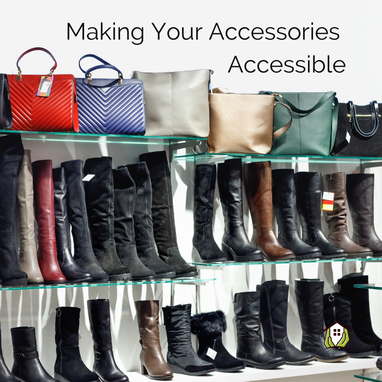 Last week, I shared my favorite tips on keeping your clothes organized, accessible and in tip top shape. But for many of you, the real struggle is what to do with all your accessories so that you can both easily see what you have when putting together an outfit and effortlessly put them away when you are done wearing them. Nothing is worse than realizing as you’re rushing out the door that you’ve misplaced a shoe or an earring. Not only that, it’s likely that a lot of your bedroom surface clutter consists of stray jewelry, scarves and other accessories that are strewn around, collecting dust and creating lots of visual noise and chaos in the one room that’s supposed to feel the most peaceful and calming. Never fear! You’ve come to the right place for options on maintaining accessible accessories. Shoes, purses, jewelry, scarves/ties, belts, hair accessories...with all that going on, it’s no wonder your bedroom can get out of control so quickly! There are as many different ways to organize all these accessories as there are styles. The good news is that you don’t need to own a huge walk-in closet or spend a fortune on customization to impose an adequate amount of order. The key is creating an organization structure for each accessory type that: 1) fits within your available space 2) is accessible enough to both see what you have and easily put things away 3) accommodates your collection (paring your collection down to fit within your chosen organization structure is a great strategy for keeping it in check over time). I’m going to share multiple storage options for each accessory type, along with some of the pros and cons for each, so that you can easily choose the right fit for you. Shoes Shoe cubbies or shoe chest - whether you are lucky enough to have built-in shoe cubbies in your closet or a piece of furniture specifically designed for storing shoes, or you create one using boxes, cardboard tubes or crates turned on their sides, this option creates a spot for holding each individual pair in your collection so that they are all visible at a glance.
Tip for boots: Inserting pool noodles or cardboard tubes to keep them standing upright will preserve their shape longer and save space in your closet. Purses Shelves (tip: stuff purses to maintain their shape and help them stand up...great use for those air pillows that come with your Amazon purchases)
Belts and scarves/ties Drawers - fold scarves, coil belts or ties and insert in dividers; or lay ties flat
Jewelry and hair accessories Jewelry box, chest or trays (including drawer inserts or dividers)
Think outside the box There’s lots of room for creativity when it comes to storing your accessories. You’ll find a wealth of ideas on my “Organizing Outside the Box” board on Pinterest. Some of my favorite ideas include:
Stay tuned next week for tips on keeping your bedroom and bathroom linens organized, easy to access, and under control! Are you following EasyPeasy Living on Facebook? Don’t miss out on daily tips, advice and strategies for streamlining your home and your schedule to make more time for the things that really matter. Enter prize drawings by participating in the monthly EasyPeasy 1-Day Challenge that’s announced at the beginning of each month on Facebook. Find quick and easy recipes, discover simple solutions to everyday problems, and learn the answers to commonly-asked organizing questions from others just like you. It’s all at www.facebook.com/easypeasyliving.
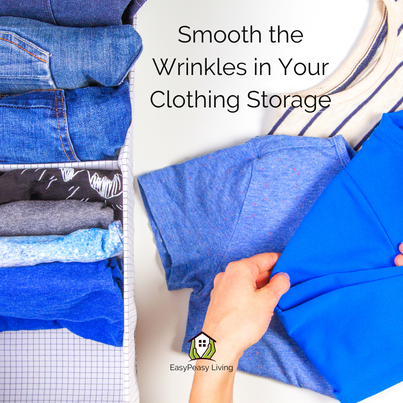 Can you believe it’s June already?!! This month is Bed and Bath Organizing month. We’ll make your bed and bathroom the restful sanctuary you deserve with tips on organizing your clothes, accessories, linens and toiletries so that getting ready for your busy day or a peaceful night’s sleep will be seamless and easy peasy. This week I’m sharing my favorite strategies for keeping your clothes easily accessible, tidy and organized. Now that the world is opening back up and life is beginning to take on some semblance of “normal” again, it’s time to take stock of that wardrobe. Some of us have put on a few pounds since the beginning of the pandemic, while others have lost weight. Whether you’re in a new size now or not, taking stock of what you have, purging what no longer fits the way you'd like or works in your current lifestyle, and organizing your closet and drawers will ensure that you're ready to get back out there in the real world looking your best. An organized clothing system will also save you time and hassle in the morning, keep clothes in better condition longer, and -- my favorite -- reduce dry cleaning bills and ironing. Follow these ten tips to maximize space and functionality in your dresser and closet.
Are you following my Facebook page? If not, you're missing out on daily tips, advice and strategies for streamlining your home and your schedule to make more time for the things that really matter. You'll find quick and easy recipes, discover simple solutions to everyday problems, and learn the answers to commonly-asked organizing questions from others just like you. What's more, you can win prizes when you participate in the monthly 1-day EasyPeasy Challenge that’s announced on the second day of each month on my Facebook page. You'll find it all at www.facebook.com/easypeasyliving.
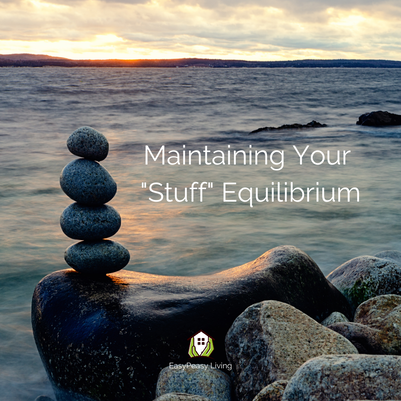 We are nearing the end of Purging Month, but just like doing laundry, mowing the grass and grocery shopping, purging your excess stuff never really ends. The good news is that it doesn’t require a lot of time or effort to keep up with it once you’ve completed your initial purge. This week, I’m gonna share a few easy peasy habits that will make divesting yourself of your overage an automatic routine. The more of these habits you embrace, the easier it will become to maintain your equilibrium of "stuff". First, set yourself up for success with a solid plan for what you will do with each item you decide to let go. (For more ideas on this, go back and read last week’s blog post.) Establish a holding spot/s for items to donate and items to sell (if you decide that’s really worth your time). Make it an easily accessible and consistent location or locations in your home. Next, create a regular schedule for getting your castoffs out of your home. Whether it is scheduling regular donation pickups (or just getting in the habit of always saying YES! whenever you receive a notification that a truck will be in your area), or finding a consistent time each month to drop things off at a local charity, put it on your calendar and set up a reminder to follow through. Likewise, if you are selling items, set deadlines on your to-do list for pricing, posting, or otherwise preparing your items for upcoming sales events or dropping them off at a consignment shop. Schedule one weekend out of every month (more if needed) for dropping off any recyclables or trash that can’t be included in your regular household pickup, or create reminders to take them whenever you are out running errands nearby. Then simply collect as you go. Opportunities abound to identify items you no longer need/want/use. As they come up, decide right away if they are 1) Sell; 2) Donate; 3) Recycle; or 4) Trash and place them into the proper receptacle immediately. Don’t procrastinate! Take action at moments like the ones below:
Eliminating belongings you don’t need is just like discarding your food wrappers and containers when you’re done with them. You already know you can’t/won’t use them, so it’s just a matter of putting them in the correct receptacle and following through with your predetermined plan for getting them out of the house. Decisions will become quicker and easier each time you make them. Before you know it, it will become as second nature as throwing away your candy bar wrapper or recycling your empty soda bottle. If there’s an item you’re on the fence about, treat it just like something from your freezer you aren’t sure if you’ll eat or not and add an expiration date to it. If you don’t use it by then, let it go. Finally, just like you occasionally still have to deep clean the rooms you clean regularly, make a point of “deep cleaning” your cabinets, shelves and drawers at least once per year to catch any expired or excess stuff you may have overlooked. You don’t have to set aside days or hours of time to do this unless that’s your preference to get it all done at once. Instead, just work on one room in your home each month and spend five to ten minutes per day performing the three Rs (remove, review, replace) on a single drawer, shelf, or cabinet at a time until the entire house is done. Then start again. The less stuff you have, the easier and quicker this ongoing process will be. If you took my advice and joined an online give-away group like Freecycle or Buy Nothing, you’ll find that there are often people requesting one of your "someday/maybe" items. Knowing that someone else is looking for that exact thing may be enough to convince you to part with items you aren't sure you'll ever need again. These groups also offer assurance that you’ll be able to easily get whatever you need when you need it...for FREE, eliminating your need to hold onto things “just in case”. For this reason alone, I strongly urge you to consider joining one of these groups if you haven’t already done so. I’ll be taking a week off from the EPL Blog next week. Enjoy your Memorial Day! Coming Soon: June is Bed and Bath Organizing month! I’ll be sharing tips all month on organizing your clothes, accessories, toiletries and makeup both here and on my Facebook page. Subscribe to this blog make sure you don’t miss anything! ICYMI: Each month I issue a new 1-day EasyPeasy Challenge that can be completed in less than a day (usually in less than an hour) and keep you on the path toward orderly living. You have all month to take the challenge and then add a comment, photo or GIF to the challenge post that's pinned to the top of my Facebook page to be entered into a prize drawing at the end of the month. This month’s challenge is to join an online group like Nextdoor, Buy Nothing or Freecycle and give away just one item. It must be given away...with no expectation of receiving anything in return. Give it a try! I look forward to seeing your photos and comments on my Facebook page!
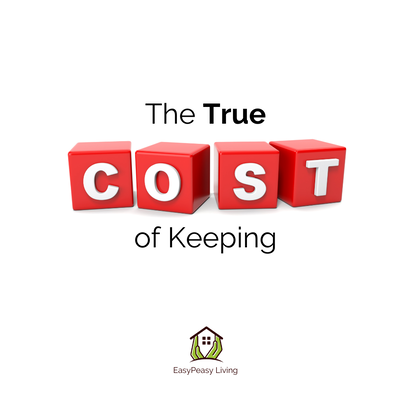 Several years ago, a neighbor friend of mine who knew that my husband and I wanted to get in shape offered us--FREE--a treadmill that had been sitting idle for some time in her basement. We were ecstatic! That treadmill was just what we needed to transform ourselves from couch potatoes to svelte beach bodies by the time bathing suit season rolled around (well okay...give or take 50 pounds). Best of all, the price fit right into our meager (read: nonexistent) budget. We’d have to be crazy to say no to that...right? While impulse purchases are a real thing, most of us actually do weigh the cost vs. benefit before we acquire something new. Thus, something free + something we want = YES! So why are our closets and garages so crammed full of stuff we never use? Clearly, we are miscalculating something. Perhaps we're leaving something out of the equation. I propose the correct formula should be: Financial cost + Space cost + Convenience cost + Opportunity cost = True Cost Most of us don’t see past the money and never even think about the last three components of this equation, probably because they are difficult to quantify. But omitting them from the equation altogether is how we wind up feeling disorganized, frustrated and suffocated by all our stuff. Let’s take a closer look: Financial Cost This is usually the primary and often the only cost we consider when deciding whether or not to acquire something new. If you want proof, look no further than the ridiculously long checkout lines at your local Dollar Tree. How many times have you bought something just because it was “such a great deal”? And note that I keep using the word "acquire". That's because considering the cost of something applies even to--especially to--items for which we paid no money at all. Interestingly, the more money we pay for something, the less willing we are to part with it once we realize it was a poor purchase. And the longer we keep it in some vain attempt to “get our money’s worth” out of it, the more it ends up costing us...in space, in convenience, and in opportunity. As my husband and I would eventually discover, that $0 treadmill was most certainly not free, after all. Space Cost Ah space…the final frontier! Most people completely underestimate the value of empty space. We see it as something to be consumed instead of recognizing the important role it plays in keeping us organized and sane. Every single item you own--from vegetable peeler to king-sized bed--costs you valuable space. Like money (and cake), you cannot keep (have) it and spend (eat) it too. Overspending your space--or cramming as many objects into your empty spaces as you can--leads to clutter, visual noise, stress, and sometimes even guilt. The more spacious your environment, the easier it is to maintain and control. Purging items you no longer need/use makes it infinitely easier to see, access and keep organized the things you do. That “free” treadmill ended up costing us significant space in our small basement. Convenience Cost Life gets really inconvenient when you lack space. If you’ve ever watched one of those hoarder shows, you’ll be struck by how much more effort it takes them just to accomplish everyday tasks like cooking a meal or taking a shower. When your access to the items you need is restricted, it takes more time, energy and effort just to get them out and use them...much less to put them away again when you're done. Pretty soon, you stop bothering to put things away at all. This leads to clutter, chaos, frustration and a sense of defeat as you either lose items or they continually get in your way. Also, the more stuff you accumulate, the less visible everything becomes. If you can’t see what you have, you’ll either buy it again or you won’t use it at all. So why are you keeping it? And owning too many belongings makes you less nimble...the sheer inconvenience of moving all that excess stuff out of the way in order to make home improvements or repairs can lead to procrastination, sometimes causing or worsening damage and costing even more money in the long run. Before you know it, you’ve increased the financial cost of ownership well beyond your initial investment. Remember our treadmill? Well, we had to sacrifice some of the space we had been using for sorting and folding laundry just to make room for it. This made doing the laundry an even bigger chore than usual. Laundry baskets often ended up stacked up on the treadmill because there was no place else to put them. Talk about a motivation killer! If you think I’m going to do laundry first just so that I can exercise, think again! In my book, Exercise + Laundry = Forget it! The convenience cost of that treadmill in doing laundry was huge, not to mention that actually being able to use the treadmill itself was so inconvenient, it ended up just sitting there collecting dust for months. So why keep it? Good question! Opportunity Cost What are you missing out on because you’ve acquired too much stuff? If you had just said NO to some of those “great deals” would you have had the money to go on a weekend getaway with your sweetie? If you could've just made do with fewer kitchen gadgets, might you have more space to share your love of cooking with your grandchildren? If you cleared all the “some day maybe” stuff you paid good money for out of the guest room closet, would you be more likely to entertain overnight guests? It was summer when we said yes to that treadmill, so we forgot that the only spot we had available to put it in is where we normally put our Christmas tree...right across from the fireplace, next to the big recliner where my husband reads ‘Twas the Night Before Christmas to the kids every Christmas Eve before bed. There was no room for our tree in the basement that year. No enjoying the beautiful lights by the warm glow of the fire. That treadmill ended up costing us a valued family tradition that Christmas, and it was truly a bummer. The good news is that you can mitigate the costs of the things you own if you just ask yourself a few simple questions before you acquire anything new:
We’ve all made mistakes in saying yes when we should have said no, but that doesn't mean you have to keep paying the price for your error. That treadmill? We gave it back to our neighbor and joined the gym instead. You see, we concluded that the financial cost of a gym membership was worth what we would save in space, convenience and opportunity. Don’t let what you paid (or didn’t pay) for something interfere with righting what's wrong. With a little honest contemplation about the true costs of ownership, even saying no to a blowout sale can be easy peasy! Don't miss out! Sign up to have each new EPL Blog post delivered to your inbox each week.
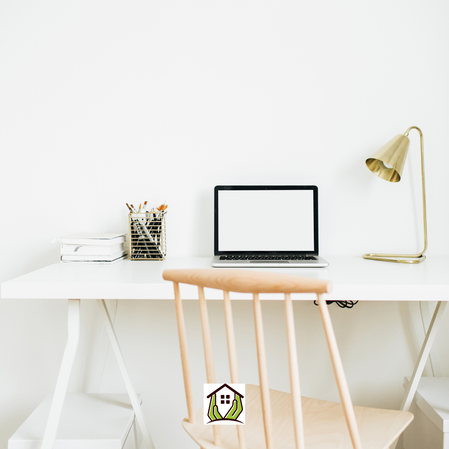 Blank space promotes visual peace Blank space promotes visual peace Space truly is the final frontier! Everyone seems to be on an endless quest for it...for space in their homes...on their desks...in their busy lives! Yet it eludes most of us. Just as soon as we find some....poof! It’s gone and the search begins anew. But what if instead of spending all of our space, we kept some of it….empty?!! Today, I’m making a case for space! First, how is empty space even useful?
Preserving your empty space boils down to choosing space over stuff. You may be asking...if empty space is so valuable, then why do people tend to choose stuff over space? Good question! Clients usually call me when their lack of space begins causing a problem in their lives. They are aware that they need more space, yet still seem compelled to fill it back up again when given the opportunity. Why? Here are some of the most common reasons, along with my counterpoint for each one: Do any of these sound familiar? Fear of being without something you may need (clothes, paper towels, shoes, serving dishes). Counterpoint: If you run out of something, you can go shopping, do laundry, borrow from a neighbor, order online. If none of these are possible, you will likely find a way to make do in an emergency. Such emergencies will be very rare and far outweighed by the everyday benefits of having more space. Think up a back-up plan in advance if that makes you feel less afraid to part with something. (Personal aside: At the beginning of the COVID-19 crisis when toilet paper was difficult to find, I came up with multiple contingency plans for if/when we ran out. I never had to use any of them, but now that I have them, I don’t feel a need to use up my valuable space hoarding toilet paper.) Avoiding a deep-seated (and usually misplaced) perception of poverty and/or a misperception of “wealth”. Counterpoint: Having more stuff doesn’t make you rich. It actually costs you more in the long run. Would you rather be “rich” in stuff that gets in your way, or rich in time and energy that can be spent on having new and meaningful experiences, learning more about the world, and forging/maintaining important relationships? Which will matter more at the end of your life? Remember, that old adage “You can’t take it with you” refers to your material wealth, aka your "stuff". Unwillingness to make choices (aka decision deferral). Counterpoint: Making decisions gets easier and quicker with practice and takes less time when you do it on a daily basis. Developing a habit of making decisions in the moment takes effort but will pay huge dividends in the long run. Need to fill up the other aspects of life that feel empty (relationships, self-esteem, productivity, sense of control). Counterpoint: Space gives us freedom. We need space to live in, move in, fill up with the people and activities that bring us joy. When we do that, we will not feel emptiness; we will feel fulfilled. So how do we create and maintain empty space? Simple: Choose space over stuff. Now that you understand the value of empty space and why you may have chosen stuff instead in the past, it will be easier to make more intentional decisions in the future. There are three key components to this:
With a little conscious decision-making and a few good habits, even holding onto empty space can be easy peasy! 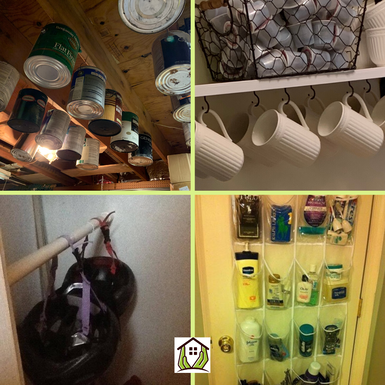 Okay, so you've purged all your excess stuff, replaced single-function furniture and items with multi-function alternatives and organized what's left as efficiently as possible using all the techniques in last week’s blog and still don't have enough room? It's time to stare at the wall, or hang it up...literally. There's oodles of unlocked storage potential on those walls, as well as behind, above and on the backs of all your cabinets and doors. Tap into the wealth of vertical space, and you will be amazed at how much more additional storage room you actually have to hang stuff up. Clockwise from top left: Paint cans hung from floor joists; Mugs hung from shelf; Bike helmets hung from tension rod; Toiletries stored in shoe pocket organizer on back of bathroom door. Just a few ideas to get you started:
So the next time lack of space has you feeling down, look up for inspiration. The sky's the limit...literally Don't miss out! Subscribe to the EPL Blog and get each new post delivered right to your email inbox.
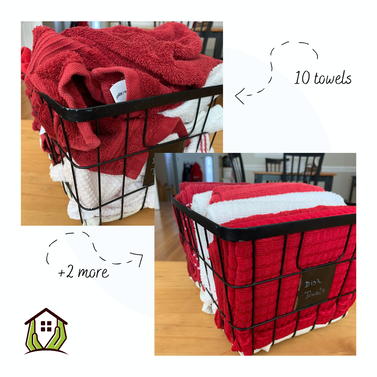 Proper folding is a great space-saver Proper folding is a great space-saver My husband used to get annoyed with me for re-loading the dishwasher after he had already loaded it. Eventually, he stopped doing that task and now just says, "I'll let you work your magic." He knows I can always get a lot more in. But it isn't "magic" at all...it's just a matter of knowing how to use the rack space efficiently. If you've been following @EasyPeasyLiving on Facebook, Instagram or this blog, you know that I've been sharing tips all month on how to create more space in your home. We started with the Declutter Challenge to get rid of all that excess stuff you don't really need. Then in last week's blog, I explained how seeking out multi-functional items to serve double-duty around the house, instead of buying multiple items that each only serve one purpose, can save a lot of storage space. This week, I'm going to share some tips for eking out even more space here and there -- without even getting rid of anything -- just by using the space you have more efficiently. While it is true that neatness does not necessarily equal organization and vice versa, it does tend to be the case that most truly organized homes are also neater. Mostly that's because it's easier to keep it neat when it's organized. But did you know that being neat can also save space? Consider a pile of papers...not that I'm encouraging you to have too many of these, mind you. Which takes up less space on a desk, a cascade of messy papers, or a neat stack of papers? When items are neatly stacked or folded, you can almost always fit more into a smaller space. Adopting a few simple strategies can make a big difference in just how much space you are able to save. Fold As you can see from the photos above, I was able to fit 20% more into the basket simply by folding the towels. Not only that, the basket fits better on the shelf where it lives and towels are more easily-accessible when they are folded. However, folding alone doesn't always result in a space savings. You must also ensure you are folding items to the right size to fit your space efficiently. Don't always fold towels the exact same way just because they are towels, or you could end up with extra, unusable space next to them on the shelf. Instead, play around and figure out how to fold them in order to fit the maximum number on that specific shelf where they are stored. You may be surprised how many more you can get in simply by changing the way you fold them. I fold the dish towels above differently than I fold the hand towels that live under my powder room sink, even though they are roughly the same size. That's because they are being stored in a different sized basket. This same principle applies to clothing, sheets, blankets...anything! It's worth taking a few minutes to figure out a folding strategy for each space! Once you do, you'll be all set. Purchase Matching Sets While matching sets look nice and neat, that's not the reason I'm advocating this. Stacking items that are part of a set is generally easier and more space-efficient than stacking individual random items. This is because items in a set are usually the same size or have been specifically designed to be nested together or stacked. Think about it: dishes, food storage containers, storage bins, mixing bowls, measuring spoons, towels, etc. tend to come in sets that are intended to be stored together. You'll save tons of space by nesting food storage containers and then "filing" the lids, by size, upright in a bin or basket so that you can easily find the size you need. Sometimes lids within a set are designed to fit a variety of different bottoms. Bundle and Contain Have you ever noticed that odd-shaped stuff has a way of spreading out all on its own? I'm talking about bags and packets in the pantry, loose contents in drawers, charger cables, empty plastic shopping bags, etc. This "clutter creep" wastes a lot of space. The way to stop it is to bundle or contain it. When you store items like this in bins, baskets, boxes or drawer dividers, you are not only defining and limiting the amount of space they consume, you can literally fit more into that space. Imagine pouring a bag of sugar out onto the countertop. What happens? It spreads out across the surface of the counter into an inefficient mound. But pouring it into a canister eliminates gaps and contains the contents, consuming a smaller surface area. The same principle applies to your oddly-shaped items. Bundling and containing them also makes items easier to find and access. Remove "Fillers" Is your closet rod too tightly packed? Consider removing all the empty hangers from the rod and placing them in a basket on the floor of your closet. It's rare that you will be storing every article of clothing you own on the rod at the same time. Usually you'll be wearing some or laundering some, so why take up precious rod space with an empty hanger? And speaking of hangers, why waste space with a thick hanger when a skinny one will do the job just as well? Invest in thinner hangers to save space. Also, keep in mind that hanging clothes is more space-efficient than folding them and storing them in drawers and makes clothes easier to see and find. Another big "filler" is the air in your off-season clothes and spare linens. Pack them in vacuum bags that eliminate the air when they are in storage. Similarly, save space in the pantry by dumping items like pasta, cereal and chips into airtight containers rather than storing big boxes that are half full of air. If freezing food in zip-loc bags, lie them flat during freezing so that they will stack neatly and save space. Go with Corners Whenever possible, choose square or rectangular storage containers over round ones, as they utilize the space more efficiently and leave fewer gaps between them. Also look for straight-sided bins rather than angled ones. It may not seem like this would make a big difference, but the space savings sure do add up. Maximize Your Vertical Space This is a big way to free up space in your home. Adjusting shelf height, using walls, backs of doors and cabinets, etc. can reap big space savings. In fact, there are so many ways to create space by going vertical that it warrants its very own blog post. I'll be covering this in more detail next week, so stay tuned. With a little bit of tweaking in the right places, saving space without even getting rid of anything can be easy peasy. 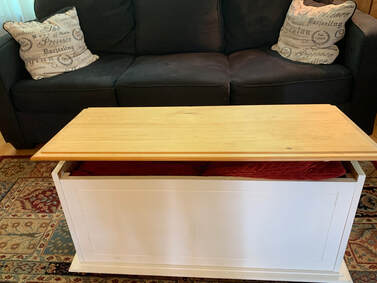 Storage trunk holds extra blankets while doubling as coffee table Storage trunk holds extra blankets while doubling as coffee table When it comes to saving space - and money - nothing beats the power of multi-taskers. Getting in the habit of investing only in items that serve a double-duty function can yield some big dividends when it comes to creating more space in your home. So what does this look like? Well, consider the many areas of your life where you can get double the usefulness objects: Kitchen
Clothes
Linens
Entertaining
Furniture
The key is to get into the habit of brainstorming how you can use your belongings in more ways than one. Before you buy something new, look around to see if you already have something else that will fulfill your need. You'll be surprised how much space (and money!) you'll save...and trips to the donation dropoff too. With a little creativity and a few multi-taskers, even creating more space in your home will be easy peasy. |
AuthorValerie Sheridan is a professional organizer, wife, mother of two, and Founder/Owner of EasyPeasy Living. Archives
October 2022
Categories
All
|

 RSS Feed
RSS Feed